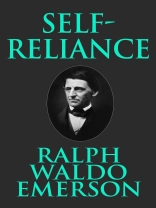Self-Reliance is an 1841 essay written by American transcendentalist philosopher and essayist Ralph Waldo Emerson. It contains a stirring call for each individual to avoid conformity and false consistency, and to follow their own instincts and ideas. It contains one of Emerson’s most famous quotations: A foolish consistency is the hobgoblin of little minds, adored by little statesmen and philosophers and divines. The essay, possibly Emerson’s most famous, is an analysis into the nature of the aboriginal self on which a universal reliance may be grounded. It was first published in his 1841 collection, Essays: First Series. Emerson helped start the beginning of the Transcendentalist movement in America.
Об авторе
Ralph Waldo Emerson (1803-1882) was an American essayist, lecturer, and poet who led the transcendentalist movement of the mid-nineteenth century. Although he began his career as a Unitarian minister, he gradually moved away from the religious and social beliefs of his contemporaries, formulating and expressing the philosophy of transcendentalism instead. Seen as a champion of individualism and a prescient critic of the countervailing pressures of society, he disseminated his thoughts through published essays and public lectures across the United States.












